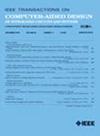FlexBCM: Hybrid Block-Circulant Neural Network and Accelerator Co-Search on FPGAs
IF 2.7
3区 计算机科学
Q2 COMPUTER SCIENCE, HARDWARE & ARCHITECTURE
IEEE Transactions on Computer-Aided Design of Integrated Circuits and Systems
Pub Date : 2024-11-06
DOI:10.1109/TCAD.2024.3439488
引用次数: 0
Abstract
Block-circulant matrix (BCM) compression has garnered much attention in the hardware acceleration of convolutional neural networks (CNNs) due to its regularity and efficiency. However, constrained by the difficulty of exploring the compression parameter space, existing BCM-based methods often apply a uniform compression parameter to all CNN models’ layers, losing the compression’s flexibility. Additionally, independently optimizing models or accelerators makes achieving the optimal tradeoff between model accuracy and hardware efficiency challenging. To this end, we propose FlexBCM, a joint exploration framework that efficiently explores both the parameter compression and hardware parameter space to generate customized hybrid BCM-compressed CNN and field-programmable gate array (FPGA) accelerator solutions. On the algorithmic side, leveraging the idea of neural architecture search (NAS), we design an efficient differentiable sampling method to rapidly evaluate the accuracy of candidate subnets. Additionally, we devise a hardware-friendly frequency domain quantization scheme for BCM computation. On the hardware side, we develop the efficient and parameter-configurable convolutional core (ConvPU) alongside the BCM computing core (BCMPU). The BCMPU can flexibly accommodate different compression parameters at runtime, incorporate complex-number DSP packing and conjugate symmetry optimizations. For model-to-hardware evaluation, we construct accurate latency and resource consumption models. Moreover, we design a fast hardware generation algorithm based on the coarse-grained search to provide prompt feedback on the hardware evaluation of the current subnet. Finally, we validate FlexBCM on the Xilinx ZCU102 FPGA and compare its compressed CNN-accelerator solutions with previous state-of-the-art works. Experimental results demonstrate that FlexBCM achieves 1.21–3.02 times higher-computational efficiency for ResNet18 and ResNet34 models while maintaining an acceptable accuracy loss on the ImageNet dataset.FlexBCM:FPGA 上的混合块环流神经网络和加速器协同搜索
块环状矩阵(BCM)压缩因其规律性和高效性,在卷积神经网络(CNN)的硬件加速方面备受关注。然而,由于难以探索压缩参数空间,现有的基于 BCM 的方法通常对所有 CNN 模型层应用统一的压缩参数,从而失去了压缩的灵活性。此外,独立优化模型或加速器使得在模型精度和硬件效率之间实现最佳权衡具有挑战性。为此,我们提出了联合探索框架 FlexBCM,它能有效探索参数压缩和硬件参数空间,生成定制的混合 BCM 压缩 CNN 和现场可编程门阵列 (FPGA) 加速器解决方案。在算法方面,利用神经架构搜索(NAS)的思想,我们设计了一种高效的可微分采样方法,以快速评估候选子网的准确性。此外,我们还为 BCM 计算设计了一种硬件友好型频域量化方案。在硬件方面,我们在开发 BCM 计算核心(BCMMPU)的同时,还开发了高效且参数可配置的卷积核心(ConvPU)。BCMPU 可以在运行时灵活适应不同的压缩参数,并结合复数 DSP 包装和共轭对称性优化。为了进行模型到硬件的评估,我们构建了精确的延迟和资源消耗模型。此外,我们还在粗粒度搜索的基础上设计了一种快速硬件生成算法,为当前子网的硬件评估提供及时反馈。最后,我们在 Xilinx ZCU102 FPGA 上验证了 FlexBCM,并将其压缩 CNN 加速器解决方案与之前的先进作品进行了比较。实验结果表明,对于 ResNet18 和 ResNet34 模型,FlexBCM 的计算效率提高了 1.21-3.02 倍,同时在 ImageNet 数据集上保持了可接受的精度损失。
本文章由计算机程序翻译,如有差异,请以英文原文为准。
求助全文
约1分钟内获得全文
求助全文
来源期刊
CiteScore
5.60
自引率
13.80%
发文量
500
审稿时长
7 months
期刊介绍:
The purpose of this Transactions is to publish papers of interest to individuals in the area of computer-aided design of integrated circuits and systems composed of analog, digital, mixed-signal, optical, or microwave components. The aids include methods, models, algorithms, and man-machine interfaces for system-level, physical and logical design including: planning, synthesis, partitioning, modeling, simulation, layout, verification, testing, hardware-software co-design and documentation of integrated circuit and system designs of all complexities. Design tools and techniques for evaluating and designing integrated circuits and systems for metrics such as performance, power, reliability, testability, and security are a focus.

 求助内容:
求助内容: 应助结果提醒方式:
应助结果提醒方式:


